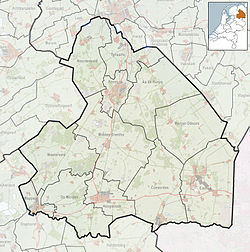Geesbrug | |
|---|---|
 Bridge at Geesbrug | |
| Coordinates: 52°43′40″N6°38′2″E / 52.72778°N 6.63389°E | |
| Country | Netherlands |
| Province | Drenthe |
| Municipality | Coevorden |
| Area | |
• Total | 19.01 km2 (7.34 sq mi) |
| Elevation | 15 m (49 ft) |
| Population (2021) [1] | |
• Total | 1,355 |
| • Density | 71/km2 (180/sq mi) |
| Time zone | UTC+1 (CET) |
| • Summer (DST) | UTC+2 (CEST) |
| Postal code | 7917 [1] |
| Dialing code | 0524 |
Geesbrug is a village in the Netherlands and is part of the Coevorden municipality in Drenthe.
Geesburg was first mentioned in 1913, and means the bridge near Gees. [3]

